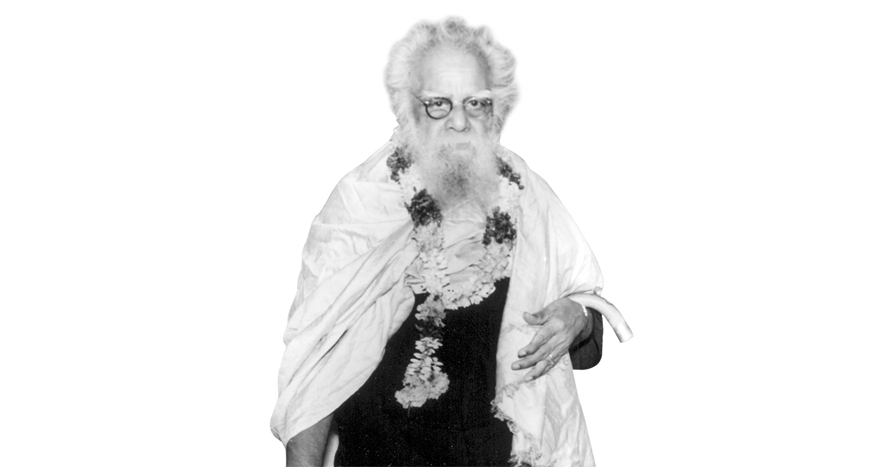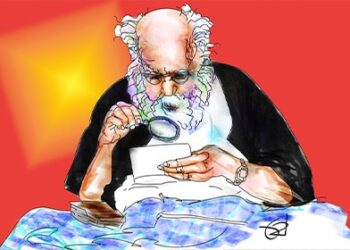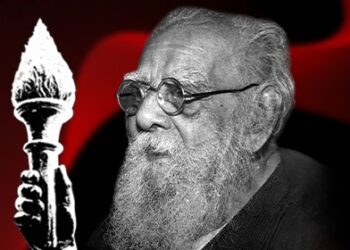The following is the translated version of the editorial in‘Kudi Arasu’ dated 6th March 1932, Tamil weekly published by Periyar E.V.Ramasamy from 2nd May 1925
The consultative Committee, one of the three formed by the British Government to formulate a programme for introducing political reforms in India has been meeting in Delhi for the last few days. They are discussing the fundamental rights which must be part of the proposed reform. The rights which they have come to an agreement upon and the political reforms based on them are not going to be of much benefit to the poor and the depressed. We are sure of it. Let us go into the reasons for our view.
Whether it is a princely state or a provincial government or the united government, it has been decided to proclaim that there is no State Religion. yet another resolution affirms recognition of freedom of religion and the popular customs and traditions. There is no doubt whatsoever, that as a result of these two decisions our people will continue to remain in the same condition as at present even after the introduction of the proposed reform.
If the people of a country are to be free from caste hierarchy, without any difference between the poor and the rich, the workers and the capitalists, the vassals and the landowners, the high and the low, and to live in the spirit of liberty, equality and fraternity, the first step will be to abolish religions and customs and traditions of different communities.
The government must boldly come forward to abolish the religions and the customs and traditions which were created from them. Without doing that, be it a government which states that there is no state religion, be it a government that adopts non interference in religious matters, or be it a government which offers protection to all religions, arts and cultures, it cannot undertake any reform that assures equality.
Whether it is autocracy, a government with dominion status or a totally independent government, it cannot be of the slightest benefit to the poor and the depressed lot.
Whatever may be the type of the government, autocracy or democracy, it should work with the principle of establishing equality, fraternity and liberty. If what comes in the way of establishing these values were religion, wealth, caste, the Vedas, civilization, customs and tradition, god or whatever it could be, the government must not have even the least compunction in abolishing them. Undoubtedly, it is only such a government which would safeguard the self respect of all its subjects.
After proclaiming that there is no state religion, what good can come out a government which follows the policy of recognizing religious freedom and customs and traditions of its people. A government that follows this principle cannot shirk from giving freedom to a religion which swindles money out of the nonbrahmins in the name of marriage ceremonies, funeral ceremonies and a number of other ceremonies, perform a marriage between a five year old girl and a sixty year old man, causing her to be widowed within days or months and spending her entire life with tonsured head, letting people waste all their money on stones and toys kept in the temples and waste all their time, toil and energy in this manner, which permits upper caste Hindus to enter the temples and prohibit the lower caste people from doing so, which grants all property rights to menfolk and no part of it to women, which permits men to marry any number of times while a woman is permitted to marry only once, compelling her to spend her widowhood in loneliness if her husband dies should such a religion be offered all the rights?
It is against religion and tradition for children of upper caste Hindus and lower caste Hindus to study in the same school, and lower caste Hindus drawing water from wells and ponds used by upper caste Hindus is against religion and tradition.
Lower caste people walking on the streets used by upper caste people is against customs and tradition. Lower caste people getting educated, dressing and grooming themselves, wearing footwear, carrying an umbrella, and their womenfolk covering their breast is regarded to be against customs and tradition. On these grounds orthodox people and bigots are permitted to persecute lower class people, are they not? Under the circumstances, neutrality towards religion and freedom of religion, religious practices and traditions by any government is not going to be of any benefit to the poor people.
Further the Consultation Committee has passed another resolution, giving in to an appeal made by the depressed people that “whatever may be the practices and tradition which differentiate between people and prevent one section of people from enjoying their rights must be prohibited.” After having granted all freedom to religion, traditions and practices, what is the meaning in making such a decision? Should the government follow the earlier decision or the second one?
Will the rich, the orthodox or the bigots who are going to have power and authority in the government to be formed, enforce the resolution that grants right to religious freedom, tradition and practices or will they enforce the second resolution prohibiting the practices and traditions which stand in the way of a section of citizens enjoying their rights? Please think about it. It can be assumed that the second resolution has been passed only by way of assuaging the feelings of the depressed people.
Yet another resolution gives unfettered freedom to the depressed people to establish, at their own expense, charitable, religious, social and educational institutions and to patronize their own religion and languages. Though, on the face of it, it looks like encouraging the progress of the depressed people, these right has not been denied to the upper caste people. All sections of people enjoy the right. This resolution is akin to the one granting right to the freedom of religion, its practices and tradition. It further strengthens the religions and cultures which hinder the people from getting united.
After having granted the rights to safeguard religion, culture and traditions, what is the use in resolving that all sections of children must be admitted into the government sponsored schools and no one must be denied admission on the grounds of caste, religion or nativity? When people are sanctioned the right to establish and conduct separate institutions, the high caste people will boycott government sponsored schools the depressed people are admitted to them. For, the bigots in each religion will not refrain from establishing their own institutions to protect their own religion and culture. When more and more such private institutions get started undoubtedly the number of government sponsored schools will get reduced. Yet, we welcome this resolution which assures at least some benefit to the people.
Hereafter whatever kind of resolutions are passed in this respect, we are sure that they will not be of much use to people.
Yet, we feel that the decision arrived at the Round Table Consultative Committee are somewhat better than that of the Congress which is demanding a swaraj where each religion, culture, practices and tradition will be protected and no group will be offered special concession. Certain decisions like the one offering rights to the depressed people in public institutions as per their proportion. There is a chance for those people to take advantage of this small opening, strengthen their hands and at least improve their position. We are happy to note the Consultative Committee has paved the way same beneficial development when compared to Congressmen who are not willing to offer even the slightest safeguard to the depressed people.
What do all those developments convey to the reformists? It is only that through their propaganda they should attempt a change of mind which would abolish the caste and religious practices and not meeting use of the present government. All these days the British government refrained from undertaking any measures of reform, saying that they are not prepared to interfere in the local religious matters. The swaraj demanded by Congress is worse than this. While going though the decision of the Round Table Consultative Committee, one cannot help noticing that even the union government that is envisaged is going to be no different.
Whatever may be the type of government formed it will only help the educated and the rich people to acquire titles, positions and authority so as to keep exploiting the havenotes. It is impossible for people to acquire liberty, fraternity and equality and live peacefully. We firmly assert that if people have to acquire self respect only a government which can abolish caste, religion, customs and traditions and everything that go with them will enable people to live in amity.
Translated by Prof. A. Ayyasamy






